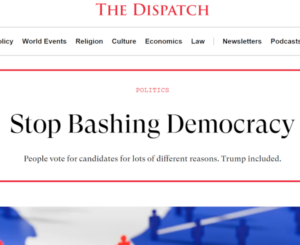Why did Trump win the election?
For eight years, I have made it no secret that I do not consider Donald Trump qualified to be the head of state and government of the most powerful nation in the Western world—primarily due to his character and temperament—and I have therefore been criticized by many of my American evangelical friends. They claim American politics is none of my business since I am neither a U.S. citizen nor a resident of the U.S. I have always disagreed—sometimes sharply—and insisted that I am very much entitled to have an opinion on U.S. politics and to express it because America, as the most powerful country (at least in the “Western” world), influences all our lives. I have also been a lifelong admirer of America, who has never forgotten that without the decisive involvement of the United States in World War II, I probably would not be living in a democratic country today. Additionally, I grew up in a home funded by the Marshall Plan, so the fate of this country is very dear to my heart.
Unfortunately, my enthusiasm and sympathy for the country have significantly diminished in recent years because I couldn’t understand how a country with around 300 million citizens, about half of whom are eligible to vote, could not find better candidates in the last three presidential elections than Hillary Clinton, Donald Trump, Joe Biden, and Kamala Harris—a real indictment. Other weaknesses have also come into sharper focus: the inability to curb the gun epidemic and the resulting mass shootings in schools and elsewhere, the inability to ensure an affordable healthcare system, especially for the poorer and more disadvantaged sections of society, and the increase in racially motivated attacks by police, to name just a few examples.
I have also become severely disillusioned about American Evangelicalism which has been a very formative influence in my life: It is incomprehensible to me how around 82 percent of American Evangelicals could, encouraged by many of their most prominent leaders, vote for a foul-mouthed serial adulterer who boasts of sexually harrassing women, demonizes his political and displays his dehumanizing disdain for people of color, women, the handicapped, members of the LGBT community, and immigrants.
Throughout it all, I never imagined that my very vocal opposition would have any effect on the outcome of the election, and sure enough it didn’t: Donald Trump won the election by a landslide, and if nothing unforeseen happens, he will steer the United States’ affairs as the 47th president for the next four years, thereby also exerting a great deal of influence on the rest of the world.
For a long time, I looked at Trump supporters among my friends, and especially among evangelical leaders, with great incomprehension, and in some cases, I was tempted to break off contact. However, I have since revised my stance on this, especially concerning ordinary voters—though I remain very disappointed and critical of evangelical leaders who brush aside Trump’s character deficits with sometimes bizarre theological arguments (it seems character only matters in political opponents, not in our own candidates).
This lengthy process of changing my attitude is difficult to describe and is probably still incomplete, but on the Monday before the election, and then three days afterward, I came across a few articles that reflect my thoughts better than I could describe them myself and that have also given me further food for thought.
 First, there was a lead article in the news magazine profil on Monday by Robert Treichler titled “America Wants to Dream”(4), in which he describes Trump’s appeal to voters:
First, there was a lead article in the news magazine profil on Monday by Robert Treichler titled “America Wants to Dream”(4), in which he describes Trump’s appeal to voters:
What is Kamala Harris’s great promise? No, I don’t mean a list of proposals from all kinds of fields, but a big idea that can deeply resonate with 150 million people.
I fear there isn’t one. The only issue Harris addressed in an emotionally stirring way during the campaign is the right to abortion. But that’s not an overarching idea for the entire nation.
Trump has such a promise: “Make America Great Again.” This simple slogan, with which Trump has campaigned for a third time, embodies many motives that create a political sense of identity. The desire for strength, a return to old, disreputable ideas, a commitment to ruthlessness toward opponents, and defiance of moralistic objections…
Trump intertwines his slogan with his numerous character flaws. But the vow to make America great again apparently still outshines all the unspeakable things.
 In the same issue, Siobhán Geets and Robert Treichler answer 47 questions about the U.S. presidential election in an article titled “Do You Understand America?”. It begins:
In the same issue, Siobhán Geets and Robert Treichler answer 47 questions about the U.S. presidential election in an article titled “Do You Understand America?”. It begins:
Would you vote for a black woman or a man convicted of sexual abuse, who is also suspected of attempted election fraud and inciting an uprising? You may not have to think long. The trickier question is: Why does the above-mentioned convicted felon—you’ve recognized him by now, it’s Donald Trump—have a good chance of being elected the 47th president of the United States next Tuesday?
Trump’s ongoing popularity and political success are baffling. But there are explanations: It is a fact that Trump recognized the problem of illegal immigration early on and made it a political megatopic, similar to right-wing parties in Europe. In his unique style of grotesque exaggerations, he demonizes migrants as murderers and rapists, even going so far as to claim that immigrants from Haiti “eat other people’s pets.” Nevertheless, even though Democrats have since imposed restrictive measures against illegal immigration, a large portion of the population grants them no credibility on this central issue.
Additionally, the politically charged question of identity politics comes into play. Democrats fight for diversity, LGBTQ rights, and abortion rights. John Della Volpe, director at Harvard Kennedy School’s Institute of Politics and a former advisor to Joe Biden, warns that they are neglecting men in the process. These men increasingly turn to the Republicans, who promote a carefree role model with limited tolerance for patriarchal and sexist behaviors. It’s entirely normal for one half of the population to want something different than the other half.
However, the problematic aspect is that the two halves no longer seem to meet on any level—not even figuratively. Trump supporters believe the 2020 election was rigged, dismiss court rulings, ignore warnings from his former associates about Trump being dangerous or even fascistic. Thus, all accusations from the other side fall flat.
Although Trump himself says outrageous things, such as wanting to use the military against “enemies from within”—meaning his opponents within the U.S.—his supporters dismiss these as typical exaggerations. Meanwhile, the other half of the country shudders in horror.
Similar reflections to these during the past year have led me to try to understand ordinary Trump voters better and to approach them with more tolerance.
 Finally, three days after the election Jonah Goldberg’s newsletter titled “Stop Bashing Democracy!” arrived in my inbox. He writes:
Finally, three days after the election Jonah Goldberg’s newsletter titled “Stop Bashing Democracy!” arrived in my inbox. He writes:
And that, in a nutshell, is the grave error people are making. People vote for candidates—any candidate—for lots of different reasons. If you think Trump is a fascist, fine. We can talk about that. But just because you think he’s a fascist doesn’t mean someone who voted for him agrees with you and voted for him anyway. I know dozens of people who voted for Trump. None of them are idiots or fascists or fascist idiots.
This argument works every bit as much in the other direction. You may think Kamala Harris is a “communist” or “Marxist,” etc. Whether she is or not is a debatable proposition in the sense that it can be debated. But if you want people to agree with you, you need to make the argument, not just hurl the accusation. If you’re sure she is a communist, no one can deny you the right to say so—but saying so doesn’t mean everyone has to agree with you. Very few of the 68 million people who voted for Harris did so because they thought she was a Marxist or a communist.
I still believe I am correct in my assessment of Donald Trump, and that Trump’s supporters are mistaken, but I now understand them better, especially since Kamala Harris (just like Hillary Clinton eight years ago) was only a marginally less problematic candidate.
Now, lets jump back across the Atlantic to my country, Austria. Much of what Robert Treichler and Siobhán Geets write can be applied almost one-to-one to our situation, where Herbert Kickl, in my opinion a completely unsuitable candidate, won the most votes in the parliamentary election. Fortunately, he did not receive a governing majority, and no one wants to form a coalition with him, so there is a good chance we will have a coalition government, possibly involving the ÖVP, SPÖ, and perhaps NEOS.
But one thing is clear: if the new government continues with “business as usual”, Kickl will garner even more votes in four years, and perhaps even an “absolute majority”, enough to govern. Blaming it on stupid voters won’t help then either. Because the problem here, as in America (and many other countries), is the same: a political class, an aspiring elite too committed to their own interests and ideological pet issues to care about the concerns and fears of ordinary citizens. It may take different forms in America and here, but at its core, it’s the same.
Footnotes:
-
- Note 1: These figures are estimates from 2020 ↩️
- Note 2: Robert Treichler was born in 1968 in Graz, studied French and philosophy, and has been a journalist with the news magazine profil since 1997, serving as deputy editor-in-chief since 2021. In 2024, together with Gernot Bauer, he published the book Kickl und die Zerstörung Europas (Kickl and the Destruction of Europe) with Zsolnay. ↩️
- Note 3: Siobhán Kathleen Geets, born in 1984 in Vienna, studied cultural and social anthropology at the University of Vienna with a focus on gender studies, international development, philosophy, and religious studies. She completed her thesis on ladyboys in Thailand and was awarded her degree in May 2008. From October 2008 to September 2009, she attended a course at the Vienna School of Photography. In January to February 2008 and February to March 2009, she conducted field research in Thailand, interviewing ladyboys for her thesis and a radio feature for Ö1. Since 2020, she has been part of the foreign affairs team at profil. ↩️
